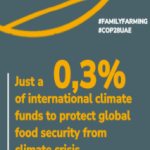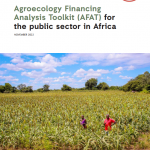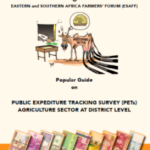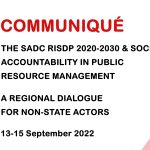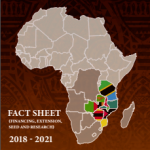Involve project: awakening farmers’ to their rights in words and deeds across East Africa
17/05/2016
Involve project: awakening farmers’ to their rights in words and deeds across East Africa
*The battle to reduce food insecurity
By ESAFF Correspondent
Building the capacity of small scale farmers in agriculture policy dialogue and budget monitoring has multiplier effects in poverty reduction and needs to be enhanced across the Eastern African Community.
This is one of the key lessons learnt during the implementation of Involving Small Scale Farmers in Policy Dialogue and Monitoring for Improved Food Security in the East African Region (INVOLVE) Project (01/12/2012-31/05/2016) according to Mr Serge Benstrong, the Eastern and Southern African Small Scale Farmers’ Forum(ESAFF) Chairperson.

The project has played a great role in strengthening the capacities of the ESAFF network and its members in East Africa. “ESAFF country chapters and their grassroots members have been strengthened to be more active in participating in agricultural policy processes including effective monitoring of resource allocation and utilization at the central and local government levels throughout the EAC countries,” noted Mr Benstrong.
An independent evaluation of the project noted IVOLVE main strengths were that it was built on the matters of concern of the farmer network and its members and build on existing capacities and resources at all levels.
“Its interventions were pitched at multiple levels at which the network operates: grassroots members, country members and the regional body. It made a clear connection between the three main components of the project, with each component having a discernible logic,” notes the report.
MVIWATA bulk marketing experience scaled up innovations, training of trainers workshops created multiplier effect and pilot engagements with grassroots farmers on Public Expenditure Tracking System – PETS, enhanced focused accountability, noted the report.
MVIWATA’s experience on agricultural commodity bulk marketing was disseminated and policy makers convinced on importance of “cross-border trade centres” in the EAC region, for enhanced food security.
The evaluation report indicates that the goal of strengthening the capacities of ESAFF network and members at regional, national and grassroots was fully realised. There was improved governance, enhanced networking, effective advocacy and participation in agricultural policy processes, and monitoring of resource allocation and utilization at central and local government levels throughout the EAC countries.
The project managed to enhance ESAFF contributions in EAC countries to the harmonization of agricultural and trade policies and regional integration through evidence-based advocacy and policy engagement.
At EAC level, thanks to ESAFF led advocacy, EALA agreed to work towards domesticating the Malabo with 7 goals, and spearhead the establishment of EAC Agriculture Advisory Council. The EAC secretariat agreed to include small scale farmers in making the CAADP Compact. At national levels issues of 10% budget call are widely discussed, trade ban, extension services, finalization of irrigation schemes, rural roads and seed distribution were addressed by central and local governments.
The independent evaluation report by Dr. Mutizwa Mukute notes that project offers key lessons including that a transparent, accountable, organised, united and informed small scale farmers have power to hold duty bearers accountable, ensure translation of good policies and reduce food insecurity.
Another lesson is that bulk marketing ensures that small scale farmers’ access to market through the generating necessary quantities, quality and economies of scale;
It hails farmers public Expenditure Tracking Survey (PETS) approach as being helpful for enabling farmers to demand local government accountability on budgets but adds that it should be expanded to the more comprehensive Public Social Accountability Monitoring (PSAM).
Generally, the project was largely effective, efficient because it achieved its twin objectives and most of its targets and was implemented as planned apart in politically difficult Burundi, said the report.
The project was impactful, it is noted as it increased ESAFF membership, technical capacities and agency to influence policy and public sector infrastructure and service provision at local level and resulted in material changes in the livelihoods for small scale farmers and consumers in the EAC. “The removal of the agriculture commodities trade ban, the establishment of border markets and their incorporation in EAC countries reduced food insecurity in districts and regions that experience periodic food deficits,” its noted.
The Involve project was implemented in five east African countries by five ESAFF members, namely MVIWATA in Tanzania, ESAFF-Uganda in Uganda, Kenya Small Scale Farmers Forum (KESSFF) in Kenya, APPEEE in Rwanda and ESAFF-Burundi in Burundi.
The implementation was done thanks to a partnership among ESAFF, the Network of Farmer Groups in Tanzania (MVIWATA) and Groupe de Recherches et d’Échanges Technologiques (GRET). It was funded by the European Union (EU) to a tune of 1.8 million EUR for 3.5 years with matching funds from Oxfam Novib, Bread for the World and Africa Trust.

















